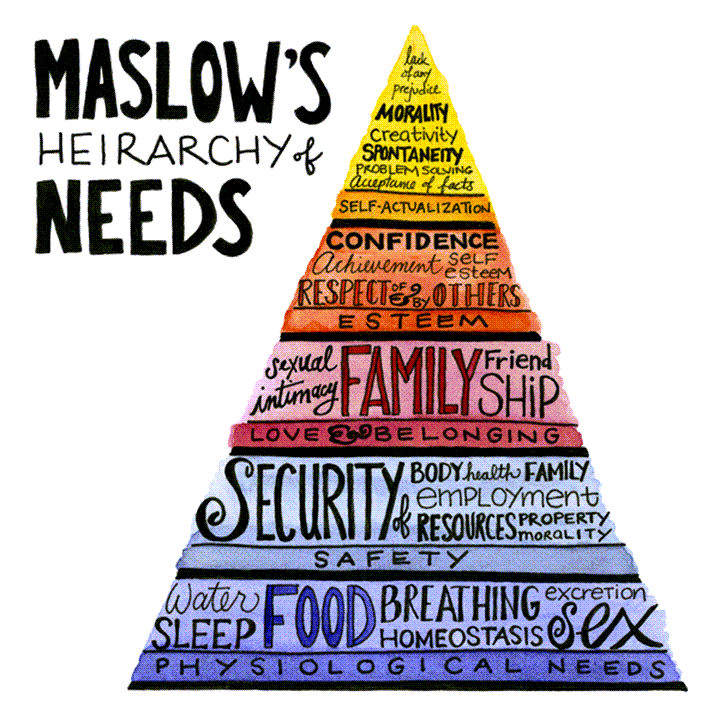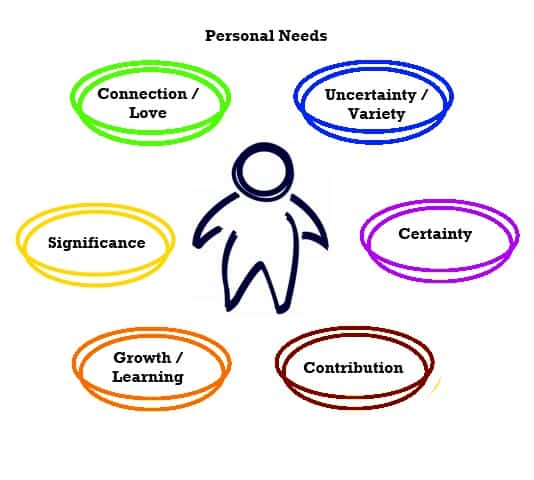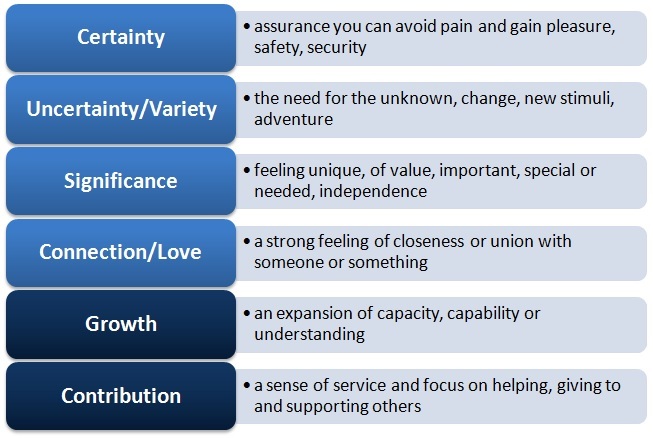When the Need for Certainty / Comfort is Important to You

Let’s first review Abraham Maslow’s theory of human needs. In 1943, Abraham Maslow proposed the hierarchy of psychological needs, illustrating an order of human motivation.
It is often depicted as a pyramid because Maslow initially suggested that we must satisfy our Physiological Needs first, followed by our need for Safety, Love, and a Sense of Belonging, then Self-Esteem, and finally, Self-actualization in that order.
Maslow later clarified that the order in the hierarchy “is not nearly as rigid” as he originally implied.
For example, for some, the need for Self-Esteem could be more important than the need for Love. For others, the need for creative fulfillment may supersede even the most Basic Needs.

For these reasons, Cloé Madanes, a world-renowned innovator and teacher of family and strategic therapy, separated the Emotional areas from the Physical and reworked the needs into “The Six Human Needs.“
Cloé explains that the Six Human Needs are not “Desires” but actual “Psychological Needs” that we continually try to satisfy consciously and subconsciously.
Your needs influence your deepest motivations and determine how you prioritize your decisions and actions throughout your life.
If you try to meet those needs that are not in line with your values, you will experience conflict and discontent.
Conversely, when you can align your needs with your highest values, you will feel more fulfilled and complete.

The Six Human Needs work in pairs: Certainty with Variety, Significance with Love and Connection, and Growth with Contribution.
The first two pairs are in constant search of balance.
When you feel that you don’t have enough of one of the needs when you have too much of the other.
On the other hand, the bottom two needs, Growth, and Contribution, can grow separately or together.
What is the Need for Certainty / Comfort?

- You want to feel secure, safe, and comfortable at all times, now and in the future.
- Therefore, avoiding pain is very important to you.
- You can’t be happy when you’re uncertain about things.
A high need for Certainty/Comfort means striving to feel safe and secure.
You want predictability and a sense of Comfort, which gives you a comfortable mind and helps ward off stress, anxiety, and worry.
The need for Certainty is often characterized by the need to acquire short-term pleasure, regardless of whether it will lead to long-term pain.
When you strive to satisfy the need for Certainty, you might eat oCertaintylcohol excessively, smoke, or use recreational drugs.
Additionally, you might procrastinate or attempt to control other people.
These behaviors provide you with a sense of Comfort in the present, Mom. However, they could also potentially lead to pain in the long run.
The need for Certainty, of course, doesn’t end with negative consequences.
Certainty is sometimes necessary because it provides emotional stability and financial security.
How the Need for Certainty / Comfort Serves You
- You avoid risks, and you carefully plan for the future.
- You are careful and take care of yourself.
- People know you are predictable.
- You know how to be organized.
How the Need for Certainty / Comfort Hurts You
- You limit your new experiences.
- You have trouble letting Love flow when you don’t feel secure and comfortable.
- You have trouble involving yourself with people for fear that they will cause you pain.
- People sometimes think that you are controlling.
- You may seem unenthusiastic and even dull.
- You are predictable at the cost of being spontaneous.
Remember, the future is unpredictable; all we have is the present moment, and it is possible to be uncertain about the future and be happy in the present. And where there is no risk, there is no gain.
Certainty / Comfort Focus
- You focus on stability, habitual routines, and preparing and saving for the future.
- You prefer work that is stable and easy instead of work that is challenging and stretches your abilities.
Certainty / Comfort Energy
- You put your energy into organizing a secure and comfortable environment.
- You’re focused inwardly on evaluating your level of comfort-discomfort.
Certainty / Comfort Health
- You like to take care of yourself, but your need for Comfort may lead you to comfort or drink.
Certainty / Comfort Avoidance
- You tend to avoid new people and new experiences.
- You avoid relationships where there is no total commitment.
- You avoid threats and hazards.
- You fear not being in control.
Certainty / Comfort Strengths
- You are organized, reliable, and dependable.
- You can create a home and work environment that is pleasing and where people can feel comfortable.
Certainty / Comfort Communication Style
- You often discuss your internal states, emphasizing whether you feel grounded, protected, and safe.
- You frequently use words: Comfort, security, stability, and predictability.
Certainty / Comfort Stress
- You are stressed when something new is required of you when you don’t know what will happen next.
- Even if there are new opportunities, changes in plans stress you out.
- You put pressure on yourself to make sure you don’t feel insecure.
Certainty / Comfort Defensiveness
- You get defensive when changing your habits or dealing with new people and situations.
- You can get angry when people challenge your need to feel comfortable and to have predictability in your life.
Certainty / Comfort Emotions
- You worry a great deal about the future.
- You’re very sensitive to danger and experience fear easily.
- You sometimes envy people with more money or considerable income than you have.
Your Goal for Achieving Certainty / Comfort Growth and Balance
Your Goal is to achieve specific goals and growth. CertaintyanComforto, live in the present and experience the moment without focusing on what will happen next and what the future might hold.
What to do?
- It would be best if you took some risks to reap some benefits.
- It would be best to accept that Uncertainty and insecurity are a part of life.
- It would be best to stretch yourself by learning new things and having new experiences.
- Instead of fear and anxiety, you need to learn to experience excitement and joy.
- It would be best if you learned to enjoy a challenge.
- You need to develop courage and be able to act even when you feel insecure.
- You need to get a reality check from others about your fears and concerns.
What interferes with your Goal?
- You wish to feel comfortable, but planning for the future interferes with your Goal.
- You can be overproteGoale and controlling.
- You require too much Certainty.
- You can be pessCertaintybout the future.
How can others support you?
- Others can support you by introducing you to new experiences and encouraging more spontaneity and fun.
- They can counter your doubts and fears in realistic ways.
Certainty / Comfort Advice
- It would be best to stretch yourself by learning new things and having new experiences.
- Instead of fear and anxiety, you need to learn to experience excitement and joy.
- It would be best if you learned to enjoy a challenge.
- You need to develop courage and be able to act even when you feel insecure.
- You need to get a reality check from others about your fears and concerns.

